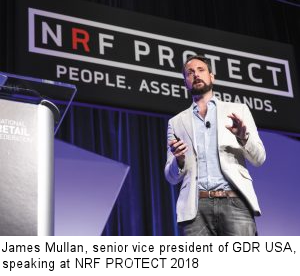|
Don't Shoot The Big Bad Wolf - He's Just The Messenger!
Forcing retailers to innovate and take risks
"Retail Needs a Hero" & One SVP Believes LP Can Be Retail's Hero
 Big day for technology evolution and justification in the D&D Daily today. Big day for technology evolution and justification in the D&D Daily today.
From Facial Recognition to RFID, Robots, Scan & Go, and BOPUS with all of them
now considered future must haves in order to compete with the Big Bad Wolf
Amazon.
But maybe Amazon isn't the Big Bad Wolf. Maybe he's just the messenger that
woke retail up and said get with it or die.
And look at how Loss Prevention & Asset Protection has been leading some of
those efforts and introduced a number of them via our surveillance, inventory,
and shrink reduction efforts and deliverables.
 As one speaker said in a
2018 NRF PROTECT
loss prevention conference presentation by James Mullan, senior vice
president of GDR USA, called “Retail’s Secret Innovation Lab: How LP can be
the modern-day heroes that future-proof your business.” As one speaker said in a
2018 NRF PROTECT
loss prevention conference presentation by James Mullan, senior vice
president of GDR USA, called “Retail’s Secret Innovation Lab: How LP can be
the modern-day heroes that future-proof your business.”
Where he basically said retail needs a new hero — someone to take the
lead in innovation. Which raises a question: If the marketing/innovation or IT
teams can’t get it done, who can make innovation happen?
Mullan’s candidate is loss prevention.
This sounds a little improbable, but he makes a good case for it. Why LP?
Because technologies known to reduce shrinkage can also be used to provide a
better customer experience. The way to sell them to management is not based on
innovativeness and glitz, but on the same basis as any loss prevention
initiative.
“LP business cases are easy to quantify and easy to understand,” Mullan said.
“And you are a trusted source. Your work, done well, typically provides a clear
return on investment that keeps CEOs, CFOs and shareholders happy.”
One such technology Mullan cited is RFID. Macy’s is running a pilot
program with wom en’s
shoes that allows it to track every individual piece of stock in the store. This
has improved display compliance by 6 percent and improved omnichannel
fulfillment. The same technology, Mullan noted, also prevents people from
stealing things. en’s
shoes that allows it to track every individual piece of stock in the store. This
has improved display compliance by 6 percent and improved omnichannel
fulfillment. The same technology, Mullan noted, also prevents people from
stealing things.
Another double-threat technology is the
combination of high-definition cameras and real-time analytics. The
cameras, like the RFID tags, are a classic LP tool with an easily demonstrable
ROI. They can spot somebody trying to sneak out with merchandise under their
coat.
The last technology example Mullan used, also involving cameras, is facial
recognition and contactless payment, where loss prevention and customer
service essentially merge. In China, this is becoming standard; the system knows
customers’ faces and their credit card account numbers. It sees them come into
the store, watches what they pick up and charges them for it as they leave.
There are Orwellian overtones to some of this technology, Mullan said. “Along
with loss prevention and customer service, I’d like to introduce a third
category: privacy. Maybe we can make the store more secure and simultaneously
improve the customer experience — but not at the detriment of the customer’s
privacy.”
That ship may have sailed as far as the Chinese are concerned. In the West,
partly due to the efforts of the European Union, privacy and the right to be
left alone are still widely debated issues.
Returning to his main point, Mullan closed his presentation with a call for loss
prevention specialists to collaborate with their colleagues in other areas to
help drive badly needed retail innovation efforts. “All the lines across
everything are blur-ring,” he said, “and I think that means you guys — LP —
need to start bringing your expertise and experience to bear with other teams.
They will value you for it.”
stores.org
CCTV's - Facial Recognition-Contactless Payments - EAS - RFID - Real-Time
Analytics - Robots
All of which LP and AP led the efforts to incorporate into the retail industry.
And quite frankly now everybody wants a part of the cameras.
Getting back to the story, today's Daily is just all about how the technologies
the LP and AP industry has been pushing for years if not decades to reduce risk
and create safer stores. And now some of them as proven in today's articles are
being considered must-haves for the future in order to not just compete but to
survive against the Big Bad Wolf Amazon. The article from the September stores
magazine, which we repurposed here just fit like a glove and furthered our
point. Enjoy today's read.
- Gus Downing


|

